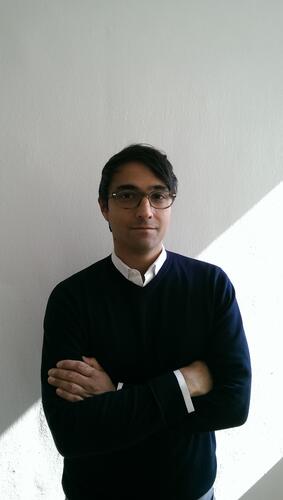
The German Department welcomes Thomas Khurana (Professor of Philosophy at the University of Potsdam) as Max Kade Visiting Professor for the Spring 2021 term. Thomas will be teaching two courses for the German Department, which you can read about below.
Thomas is Professor of Philosophy at the University of Potsdam, Germany. Previously, he has taught at the University of Essex, the University of Leipzig, and Goethe-University Frankfurt am Main. He was Heisenberg Fellow at Yale, Humboldt Fellow at the University of Chicago, and Heuss Lecturer at the New School for Social Research.
Thomas will be a recurring visitor in the Department of Germanic Languages & Literatures in the next years. In spring 2021, he will serve as Max Kade Visiting Professor and teach a course on the aesthetics of existence and the transformation of the public sphere. Thomas works in the tradition of post-Kantian European philosophy and is currently writing on the art of second nature, self-knowledge and self-objectification, and the sociality of the human life form.
Courses for Spring 2021
Aesthetics of Existence, Life as a Work of Art? GMAN 321 (Undergraduate) / GMAN 694 (Graduate)
A research seminar exploring issues at the intersection of ethics and aesthetics. We discuss the modern idea that in order to attain their highest vocation human beings need to form and transform their nature like a work of art. On this picture, we have to turn our sensible nature into a “second nature” that is expressive of supersensible ideas. After a brief look at the affinity of the virtuous and the beautiful in ancient thought, we discuss the emergence and articulation of the modern idea in Kant, Schiller, Goethe, Schelling, Hegel, and Nietzsche, before exploring how this thought has informed 20th century thought (Adorno, Foucault, Rancière, Agamben). In the last section of the seminar, we highlight the critical notion that the most recent phase of capitalism has exploited the idealist, romantic, and critical ideas of artistic creation and self-creation and turned them into a new disciplinary mechanism (Boltanski/Chiapello).
Participants should be familiar with issues in modern aesthetics and ethics.
Structural Transformations of the Public Sphere, GMAN 409
Kirk Wetters with Thomas Khurana
An in-depth discussion of the idea, the structure and the recent radical transformations of the “critical public sphere,” considered a cornerstone of liberal-democratic society. We explore the modern emergence of the critical public sphere from the public forums of critique and literary-critical discourse, followed by the two waves of “structural transformations of the public sphere” (Habermas). (1) Transformation through mass media and consumer culture, and (2) the most recent transformations of the public sphere through social media. These transformations have been welcomed as a democratization of public life, but at the same time may endanger the emancipatory ideals of enlightenment and critique at the heart of the public sphere. The ambivalent character of the recent changes, the fragmentation, capitalization, and surveillance of public life as well as strategies of resistance are highlighted.